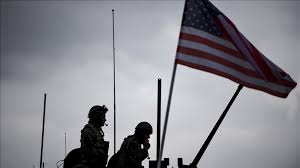Riyadh, Saudi Arabia – High-level negotiations between the United States and Russia in Riyadh have raised alarms across Europe, as reports suggest the talks could lead to a substantial reduction of U.S. military presence on the continent.
While President Donald Trump has ruled out a full withdrawal of American forces from Europe, concerns are mounting that Washington may pull troops from NATO member states that joined the alliance after 1990.
According to the German newspaper BILD, intelligence sources indicate that Russian President Vladimir Putin is pressing for a return to pre-1990 security arrangements.
Such a move would mean the withdrawal of U.S. forces from several NATO countries in Eastern Europe, a demand Putin previously made in 2021.
A European security official told BILD that Moscow’s stance has remained consistent, insisting that NATO revert to its 1997 borders, which would remove American military presence from states such as Poland, Estonia, Latvia, and Lithuania.
A report by the Financial Times has also highlighted European concerns that Trump could agree to remove U.S. forces from the Baltic region, fundamentally shifting Europe’s security landscape.
Countries that once relied on U.S. military support, including Poland and the Baltic states, fear that such a decision could leave them vulnerable to Russian aggression.
Some experts warn that an American withdrawal could embolden Moscow to escalate its military activities in Eastern Europe, potentially triggering a new security crisis.
Former Lithuanian Foreign Minister Gabrielius Landsbergis has weighed in on the matter, recalling previous Russian demands for NATO to pull back to its 1997 borders.
He emphasized that if such demands were made before, they are likely to resurface in the current negotiations.
Beyond Eastern Europe, Italy is reportedly preparing for the possibility of a U.S. military withdrawal from Kosovo. If American forces were to leave, European NATO members would be left to manage the volatile security situation in the Balkans without direct U.S. support.
This could strengthen Serbia’s strategic position in the region, given its close ties with Russia, further complicating Europe’s security framework.
Discussions in Riyadh reportedly covered a broad spectrum of NATO countries, including Finland, Sweden, Poland, Estonia, Latvia, Lithuania, the Czech Republic, Hungary, Romania, Bulgaria, Slovakia, Slovenia, Albania, Croatia, Montenegro, and North Macedonia.
However, American military installations in Ramstein, Germany, and British air force bases remain untouched by these negotiations.
European leaders are now scrambling to assess the potential fallout of any agreement between Trump and Putin on troop withdrawals.
If Washington follows through on a strategic pullback, European security officials warn that the continent could be left significantly more exposed to Russian influence and potential military threats.
The possibility of such a shift has already triggered emergency consultations among NATO allies, who fear the long-term ramifications of a weakened American military presence.
As the negotiations continue, European capitals are watching closely, bracing for the geopolitical shifts that could redefine the security architecture of the continent for years to come.
This article was created using automation technology and was thoroughly edited and fact-checked by one of our editorial staff members
Source link : http://www.bing.com/news/apiclick.aspx?ref=FexRss&aid=&tid=67b6c2ba55a1463dbb12e100781cc772&url=https%3A%2F%2Fpublicist24.com%2Fus-russia-talks-in-riyadh-spark-fears-of-nato-troop-withdrawals%2F&c=5015823355985339709&mkt=en-us
Author :
Publish date : 2025-02-19 21:27:00
Copyright for syndicated content belongs to the linked Source.


